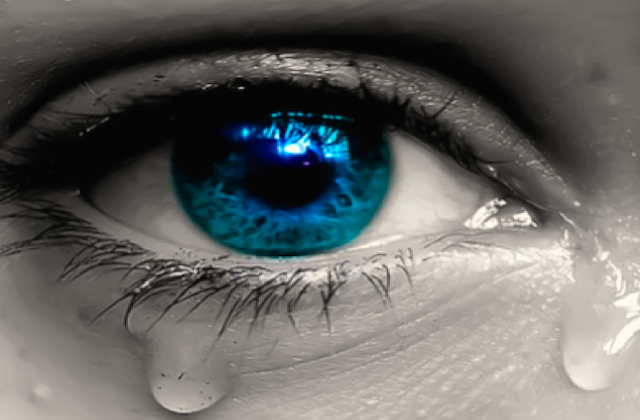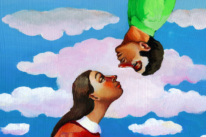
“Eyes that do not cry, do not see.” ~Swedish Proverb
Just get over it. Don’t be so sensitive. You should toughen up and grow a thicker skin…
I’ve heard this advice so much over my life, but I’ve never seen it make anyone happy.
Advised to toughen up with thicker skins so we can protect ourselves, we end up just bottling it up inside and pushing away how we feel, hoping it looks like we’re strong.
It’s like trying to avoid our own shadow. We believe it’s gone because it’s behind us, but it’s totally visible to anyone else who cares to look.
Instead of becoming stronger, this denying and rejecting behavior makes us more susceptible to danger, more fearful and wary, resulting in confusion and unhappiness, because we’ve thrown away the information we need to survive and thrive.
The Rhino’s Lesson
While I was in South Africa, volunteering for an animal conversation charity, I found myself in close proximity to a wild rhino in the early hours of the morning.
She was beautiful.
With only a few feet between us and little shrub to block her path, she did not seek to fight or flee; she just stood there.
Although rhinos are quite blind, they have other strong senses, including smell, hearing, taste, external touch, and instinctual felt sense (internal and external nervous systems).
They have thick, layered, armored skin that protects them from sharp, thorny bushes, but they are not insensitive and tough.
In fact, their survival and ability to thrive is wholly dependent on their sensitivity.
She didn’t run or charge because she didn’t feel I was a threat.
Sensitivity Is Power
Sensitivity means to be connected and aware of all our senses.
Our bodies are descendants of mammals, so we’re sensory beings.
This means, like the rhino, we are designed to use sight, hearing, smell, taste, touch, and felt sense to navigate the world around us and survive.
This sensory information creates an internal response to everything, including danger and safety, separation and bonding, otherwise known as emotions.
It’s a fact: We’re all emotional, male and female!
Unlike our animal cousins, though, we have an evolved conscious awareness to this emotional information, so they become defined as feelings—the language of emotions to which we attach judgment.
Instead of responding naturally and appropriately to this navigation system, we stress ourselves out, worry, shame, analyze, get embarrassed, get scared, get stuck, don’t act, ignore, or do the total opposite of what our body tells us to do.
The rhino does not question the sensory information the brain collects; it just acts appropriately either by running away and avoiding the danger or standing still to assess and inquire.
Or, it might run toward it, threatening with the full force of their size, strength, weight, and their strong, sharp horn. They don’t do this because they are bad tempered but because they must still protect their well-being, even though they are naturally shy, curious, and non-predatory.
Confusing Safety and Danger
Our brain continually processes sensory information to inform our responses to a situation or person by encouraging slowing down, moving toward or further away.
Teaching us to ignore, shame, disregard, and disconnect from this emotional sensory information leaves us unarmed, unprotected, and unsafe. It’s like being in conversation but only talking, never listening, and assuming what the other person thinks and feels.
The result:
- We’re unaware of danger, so we don’t know how or when to protect ourselves.
- We’re unaware or unsure if the people we choose to surround ourselves love, accept, and respect us, or are out to harm, belittle, or control us.
- We lose the ability to know what is right for our happiness, peace, and love.
- Our brains rewire to associate fear and danger with safety, and love and kindness with danger and being unsafe, so we seek the wrong thing.
This would be like the rhino ignoring her survival senses, walking up to a pack of lions, and saying, “Hey, I’m just as big as you, can I come hang out…”
How A War Zone Becomes Your Norm
This behavior is most obvious in adults who experienced abusive childhoods or were parented inconsistently by alcoholics, drug addicts, or the mentally unstable, and if they were conditioned to be good girls and boys and shamed for expressing anger, desire, or tears.
In these environments, a child absorbs the message “Don’t express how you truly feel.”
If they accepted the sensory information they received, they would have had to accept that their home environment, where they needed to be cared and protected for survival, actually felt unsafe and rejecting to live in.
It’s unimaginable for a child to acknowledge that the parents who they love might not be safe, even if they come to see a difference in other families.
They learn not to respond appropriately, as it would result in possible physical danger, punishment, and abandonment. So they disconnect, desensitize, do as they are told, try to please to make it safer, and stop trusting their feelings, because they lie and let them down.
If they continue this behavior into adulthood, they will keep seeking out the familiar—hurtful, disappointing, painful, unstable, rejecting, or even dangerous relationships and circumstances, to mirror the feelings of childhood.
Getting Emotionally Reconnected
I used think women who cried were pathetic. I thought they should just get over it and pull themselves together, as this was how I saw my own emotions.
Every feeling I had was buried away, unspoken, and unshared, branded as either a sign of weakness (as regards to crying) or unacceptable (if it was anger). I considered every other feeling bad and dangerous.
My exterior had toughened up until I was cold and as hard as an ice queen.
I chose abusive lovers, friends, and bosses over and over again, even though when I met them all I had the same uncomfortable, withdrawing feelings. I just ignored them and believed I must be wrong. And I jumped into, at worst, dangerous and, at best, rejecting and unloving environments.
Part of my self-discovery was learning to get out of my judgmental head and back into my body, and trusting its natural ability to know my boundaries and how to protect myself, so I could begin to make the right choices for my health, well-being, and happiness.
I sought people who showed me how to demonstrate my emotions openly and gave me permission to feel angry and cry. I came to understand my body’s language, so, if I felt something, I got real and responded appropriately.
If I felt happy and safe, I smiled.
If I felt safe and laughed, I opened my mouth wide and laughed wholeheartedly from my belly.
If someone tried to disrespect me, I called them on it or walked away.
If I felt desire to touch and be touch, I trusted my intuition.
No longer confused and distrusting of my sensitivity, I didn’t need to waste my energy fighting and denying how I felt.
I was now open to love and intimacy, no longer terrified of it as dangerous, or afraid of rejection, because I felt safe in my ability to know and accept the truth.
I was now listening to the whole conversation and all the information I was receiving, so that like the beautiful rhino I could own our greatest strength of all: our emotional instinct to navigate the wilderness and know who is part of our herd.
Photo by Francesca Romana Correale
About Joanna Warwick
Jo Warwick is an energy healer and therapist. She teaches women that love starts with themselves and how to feel confident, look great, and trust in love once again. Visit her at jowarwick.com.













 Though I run this site, it is not mine. It's ours. It's not about me. It's about us. Your stories and your wisdom are just as meaningful as mine.
Though I run this site, it is not mine. It's ours. It's not about me. It's about us. Your stories and your wisdom are just as meaningful as mine.
I am writing to say Thank you n
Bless and prayer pease on earth
Peace to you too…
♥…how ye 🐝?
As a #SpiritualBeing, experiencing Life, as an American of #AfricanAncestry, with a #ProSports pedigree, teaching #Empathy & NVC (#NonViolentCommunication), with my Father (who’s #LGBT), I enjoyed the exploration, into feelings vs emotions! (label vs sensation?)
I’ve Contemplated, the subtlety between ‘intuition’ (objective…turn & say hi to a soul-sibling) & ‘outuition’ (subjective…the woman who clutches her purse, in elevator, based on internal dialogue)
…thanks for the “Philosophical Aerobics” 😉
Hey Tony, thank you and hi soul being…. 🙂 Jo x
Perfect!
Thank you Dawn … Jo x
This fed me. Validated me. Challenged me. Thank you
You’re most welcome….Jox
Most people try to avoid certain emotions, but this is not possible. What you can do, however, is use those emotions in a certain way.
Great example of this is Batman. He is sad (inside) and angry (outside). However, he doesn’t use anger to break stuff or yell at people and he doesn’t sit around the house crying because he’s sad.
He uses those negative emotions as a motivation – sadness of his parent’s deaths reminds him of his goal in life and his anger pumps him up temporarily so he can be the badass he is.
I held everything in until I exploded, I grew up with the mentality of the 60’s and early 70’s. Men did not show emotion, so as I grew up I became a hateful, angry person. Laying my judgment on everybody and everything, let me tell you it did not work out well in my relationships nor life in general. I ended up an alcoholic/addict; alone, angry, remorseful, ungrateful and had no idea how to love myself. I learned after much trial and error it was me, I was the problem. Negativity was killing my spirit, and almost killed me. Today I seek self knowledge of my past as key to changing into a better person. Great article, thank you for sharing. This the link to my writings page; come check it out.
https://www.facebook.com/pages/My-Writings-and-Daily-Meditations/152157611603182?ref=hl
Hey, Thank you for sharing so honestly and sadly you have not been alone in the effects of big boys don’t cry ( i have worked with many) the same as women must not get angry!
I am so glad that you are finding a new more peaceful path of truth and hell yes men and women must be real, listen to their feelings and share themselves honestly, because only then can we actually meet lovingly and respectfully as men and women and equals…Jo x
Beautiful post, message, and insight! Thank you for sharing your experience and wisdom! 🙂
Thank you xx